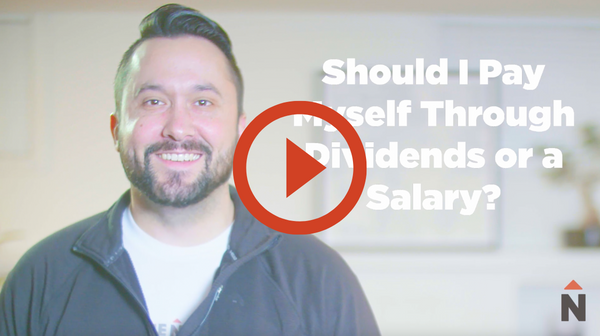Deciding how to pay yourself as a small business owner is one of the most important financial decisions you’ll make. It’s not just about getting money into your hands — it’s about maximizing your tax savings, staying compliant and setting yourself up for long-term financial success.
You might be wondering:
- Should I pay myself a salary or dividends?
- Can I split income with my spouse?
- Which option saves me more on taxes?
The answer isn’t one-size-fits-all. It depends on your unique situation, goals and how your business is structured. That’s where we come in — our CPAs are ready to help you figure it out.
VIDEO: Curtis at True North Accounting explains why this decision is one of the best opportunities to save taxes as an entrepreneur.
Who this blog is for
This advice is designed for:
- Owners of incorporated small businesses in Alberta
- Shareholders and their spouses who are active in the business
- Service-based professionals like contractors, consultants, freelancers, IT specialists, tradespeople and realtors
If you’re the owner of an incorporated small business in Canada, here’s what you need to know:
- Profits belong to your corporation until declared as personal income.
- You can’t use corporate profits for personal expenses without tax implications.
- Draws or loans from your company need to be repaid or declared as income by year-end to avoid penalties.
Click the image above for a close-up of this infographic.
Two ways to pay yourself
You’ve got two main options: dividends or wages (salary). Let’s explore the basics of each so you can decide what works best for you.
Paying yourself in dividends
- Paid as a shareholder from business profits.
- The corporation issues a T5 slip showing dividends paid in the year.
- Dividends are not a corporate tax deduction — they’re a profit distribution.
- Taxed at a lower rate personally because the corporation already paid tax.
- No Canada Pension Plan (CPP) or Employment Insurance (EI) contributions are required.
- Dividends don’t create RRSP contribution room.
- For simple reporting, add up all the draws during the year and file a T5 slip by February 28.
- Personal taxes on dividends are due by April 30.
💡 Tip: If dividends are your sole income, you can earn around $20,000 tax-free.
Paying yourself in wages (salary)
- Treated as an employee of your business.
- You may be put on a regular payroll or receive a one-off bonus.
- The corporation issues a T4 slip for wages, filed by February 28.
- Wages are a corporate tax deduction – the business will treat wages as an expense.
- Subject to personal tax brackets. Learn about combined federal and Alberta tax brackets.
- CPP contributions are required — 11.4% split between employer and employee, capped at $4,034.10 each annually.
- Wages create RRSP contribution room. RRSP contributions can be used to reduce your personal tax owing.
- Monthly payroll remittances are due by the 15th of the following month.
💡 Tip: Paying yourself a salary helps you save for retirement through CPP and RRSPs.
Which option saves you more on taxes?
Many believe dividends are cheaper because they’re taxed lower at the personal level. However, when factoring in corporate taxes, wages often result in lower overall taxes. That said, wages can be slightly more expensive because of CPP contributions.
Here’s the bottom line:
- Dividends: Easier to manage but require personal tax planning and proactive retirement savings.
- Wages: Provide benefits like CPP and RRSP eligibility but involve more upfront deductions.
Other ways to get paid
In addition to dividends and wages, you might consider:
- Shareholder loans (if you’ve lent money to the company).
- Management fees (if another corporation provides services).
- Capital Dividend Account withdrawals (tax-free in certain cases).
Let us crunch the numbers
This is a big decision, but you don’t have to navigate it alone. Our CPAs will:
- Analyze your unique situation.
- Calculate after-tax income for both options.
- Help you strike the right balance between dividends and salary.
We’re here to simplify your bookkeeping, tax filings and payroll processes so you can focus on growing your business. Book a chat with us today and let us take the stress out of tax season.
Read more about Starting a Business topics that may be helpful to you and your small business.
Like what you hear?
Are you on the hunt for a more proactive small business accountant? That’s us.

-1.png)








